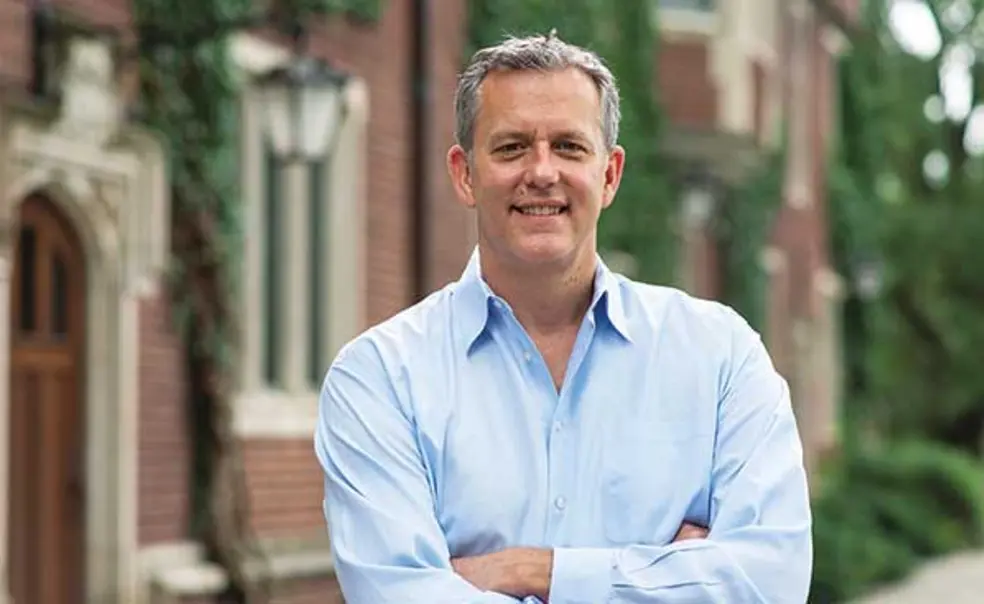New Classroom Policy Seeks to Balance Vigorous Disagreement, Mutual Respect
Nearly two years after a campus debate over a professor’s use of a racial slur in an anthropology class on hate speech, the faculty has approved a policy on classroom conduct that is designed to protect vigorous debate while maintaining respect for others.
“We were trying to find ways to talk together, as teachers and students in a community, of the virtues we aspire to have,” Professor Eric Gregory said at the Dec. 2 faculty meeting. Gregory was the chair of a special committee tasked with determining the rights and responsibilities of faculty members and students in classroom settings. “We wanted to state as a norm a desire to not personalize arguments in ways that would use gratuitous slurs and derogatory name-calling,” he said.
The policy, approved without a dissenting vote, supports a classroom environment “characterized by trust, openness, mutual respect, and a willingness to have one’s beliefs and arguments, whatever they may be, vigorously challenged.” While saying that instructors have broad authority to determine the content and the structure of their courses, the policy says it is “perfectly legitimate” for students to ask faculty members about their choice of teaching methods.
The policy encourages “the critical examination of competing points of view” and says no viewpoint, including that of the instructor, should be immune from challenge. But it says no one should be “humiliated, intimidated, or excluded” during classroom discussions, and “under no circumstances should any student or instructor be subjected to threats, intimidation, assaults, name-calling, or personal vilification.”
Following the 2018 incident, which sparked a walkout by some students in the class and the professor’s subsequent cancellation of the course (PAW, March 21, 2018), President Eisgruber ’83 formed the special committee to address University policies concerning classroom conduct and to suggest strategies for creating a positive learning environment.
The committee’s recommendations focused on the classroom learning environment, as opposed to free speech and academic freedom in general, and Gregory said the revisions do not diminish the statement adopted by the faculty in 2015 affirming the University’s commitment to freedom of expression.
During the meeting, some faculty members expressed concern that content appropriate for classroom discussion might be perceived as name-calling or intimidation. Philosophy professor Elizabeth Harman cited one example: including on a syllabus papers that support views that some people might correctly believe to be racist, sexist, or ableist, but that “are important for us to think about as a society.” Gregory said such cases would not be considered violations of the proposed policy.
The committee also called for a campus-wide conversation “that will enable all members of our community to develop greater judgment and sensitivity” on classroom conduct and spur development of specific teaching practices within academic departments.
Faculty members said they hope wording similar to the new policy will be added to the University’s guide to general conduct and principles, Rights, Rules, Responsibilities, so that it would cover all members of the Princeton community, including students.












2 Responses
Norman Ravitch *62
6 Years AgoYou Can’t Purge Unpleasant Views
Re “New Classroom Policy Seeks to Balance Vigorous Disagreement, Mutual Respect” (On the Campus, Jan. 8): If you want to learn about people in a group or classroom or anywhere else, you cannot make rules that restrict language, attitudes, or opinions. The most you can do is to forbid physical attacks. Verbal attacks are fine if they teach something. Professors may or may not be able to handle this: They used to be ladies and gentlemen when they wore coats and ties and dresses; they were not accustomed to free speech that could be unpleasant. But we have come a long way from those days. Nothing is really taboo any more; we can regret this, but it is a fact.
People can be urged to give others a chance to express themselves without interrupting with reactions to views they don’t like, but you cannot purge unpleasant views. Some may even find it possible to be negative in a polite way, but I don’t expect that very often.
William Burson ’67
5 Years AgoWhat Happens Next?
Seems like there were plenty of people “humiliated, intimidated, or excluded” during the classroom incident. What would have been the outcome had the new policy been in effect? Proctors? Are Princeton debates on sensitive subjects going forward now forever tainted? Is vigorous discussion a thing of the past?